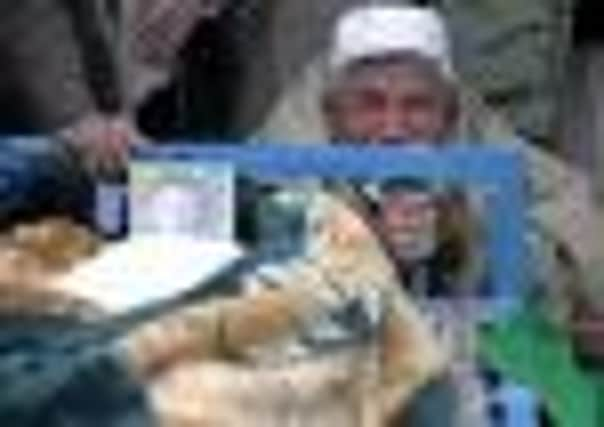Pakistani government faces anger as bomb kills 81


The country’s leaders have done little to contain hardline Sunni Muslim groups which have stepped up a campaign of bombings and assassinations of minority Shiites.
On Saturday, Lashkar-e-Jhangvi (LeJ), seen as the most ruthless Sunni sectarian group, claimed responsibility for the attack in Quetta, which deepened suspicions among Shiites that Pakistan’s intelligence agencies were turning a blind eye to the bloodshed or even supporting extremists.
Advertisement
Hide AdAdvertisement
Hide Ad“The terrorist attack on the Hazara Shiite community in Quetta is a failure of the intelligence and security forces,” Nawab Zulfiqar Ali Magsi, governor of Baluchistan province, said while touring a hospital.
Leaders of the ethnic Shia Hazara community called on the government to take decisive action, and Pakistanis warned that sectarian violence was spiralling out of control.
“The government is responsible for terrorist attacks and killings in the Hazara community because its security forces have not conducted operations against extremist groups,” said Aziz Hazara, vice president of the Hazara Democratic Party.
“We are giving the government 48 hours to arrest the culprits involved in the killing of our people and after that we will launch strong protests.”
The death toll from Saturday’s bombing rose overnight, with most of the casualties in the main bazaar of the town, capital of Baluchistan, near the border with Afghanistan. Most of the dead were Hazaras.
A senior security official said the figure could rise as 20 people were critically wounded.
Yesterday, people searched for survivors under blocks of cement torn off buildings by the blast. Many shops and bazaars were closed. Relatives of the wounded responded to an appeal for blood donors.
“The government knows exactly who is doing what and who is behind all this,” said Mohammad Imran, a local trader. “If the government wants [to prevent it], no one can take even a kitchen knife into any market.”
Advertisement
Hide AdAdvertisement
Hide AdIn the capital, Islamabad, about 400 people staged a protest demanding the government stamp out extremism.
“There is a law of the jungle, but in this country I think there is not even a law of the jungle,” said Syed Abbas Naqvi, a Shiite.
“A person who is extremely helpless, vulnerable and powerless is always made the target of barbarity whereas all brutal people like the terrorists, Taleban and others who carry out these merciless acts ... roam free all over the country.”
Protests were also held in other cities, including the commercial capital Karachi, and in Quetta.
Public anger has been growing over a host of other issues in the run-up to elections, from widespread poverty to power cuts to corruption. But waves of major sectarian attacks have highlighted its poor track record on security.
Critics say Pakistan’s intelligence agencies previously supported groups such as LeJ to fight against Indian forces in Kashmir and failed subsequently to control them.
Now Shiites in Quetta and other cities say they are under siege.
“We have grown tired of picking up the bodies of our loved ones,” said Nasir Ali, 45, a government employee. “I have lost three family members so far in such blasts.”
LeJ has also said it was behind a bombing last month in Quetta which killed nearly 100 people, one of Pakistan’s worst sectarian attacks.